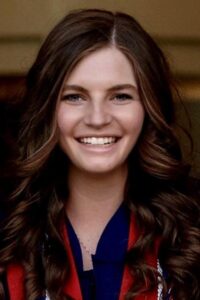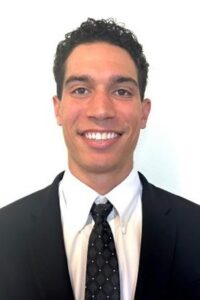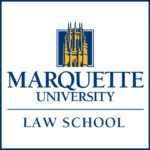In this one-week series (previous entries on Monday, Tuesday, Wednesday, and Thursday at the links), six of the 25 Marquette Law School Public Interest Law Society Fellows are sharing how public interest work has influenced their growth and shaped their professional aspirations. In this final post of the series, Morgan Millar and Evan Williams share their experiences working with the Kenosha County District Attorney’s Office.
 By Morgan Millar, 2L
By Morgan Millar, 2L
This past summer, I had the incredible opportunity to intern at the Kenosha County District Attorney’s Office. As I reflect on my experience, I feel compelled to share how this internship has profoundly shaped my future career aspirations, particularly in criminal law.
From the moment I stepped into the office, I was struck by the unmistakable commitment to justice that permeated the environment. Every day, I witnessed legal professionals passionately advocating for individuals’ rights, navigating the intricate legal system, and striving to ensure fairness and equality. This immersive experience reinforced my belief that pursuing a career as a lawyer is not just a job for me; it is a calling grounded in my desire to safeguard the rights of individuals and advocate for justice.
A Commitment to Justice
During my internship, I was actively involved in a range of essential tasks that provided me with insight into the workings of criminal law. I drafted criminal complaints, participated in charging decisions, and conducted legal research on criminal statutes, case law, and procedural rules. Each of these activities deepened my understanding of the complexities of the legal system and the critical role lawyers play in upholding the principle of justice.
I contributed to the preparation of briefs and trial materials, gaining a firsthand understanding of how legal arguments are crafted and presented. Representing the state in court proceedings was particularly meaningful; I actively engaged in hearings and trials under the guidance of experienced assistant district attorneys. These experiences allowed me to negotiate with defense counsel, draft plea deals, and present arguments on matters such as bond, probable cause, and sentencing recommendations.
Navigating Complexities
Collaboration was a key theme of my internship. I assisted with gathering pertinent information and evidence for ongoing investigations from law enforcement agencies. This involved reviewing police reports and analyzing camera footage to identify key evidence for trial. I learned that thorough investigation is vital in building a strong case, and it underscored the importance of teamwork in the pursuit of justice.
One of the most valuable experiences was assisting in teaching new law enforcement officers the courtroom testimony procedures. This not only enhanced my understanding of courtroom dynamics but also provided insights into law enforcement responses and investigative procedures. Additionally, my eight-hour ride-along shift with a Kenosha police officer was a revelation, offering a unique perspective on the challenges law enforcement officials face and the critical role they play in the legal process.
Looking Forward
I am deeply grateful for the extraordinary opportunity I had this summer with the Kenosha County District Attorney’s Office and am delighted to have been given the opportunity to continue my work there during my 2L year as well as to return this coming summer. The invaluable mentorship and support I received from everyone in the DA’s office, especially my supervisory team, have profoundly shaped my journey. Additionally, the opportunity to observe and practice in front of Judge Angelina Gabrielle taught me invaluable lessons about courtroom presence and procedure, reinforcing my desire to pursue a career in prosecution.
In conclusion, my summer at the Kenosha County District Attorney’s Office has been transformative. It has solidified my commitment to pursuing a career in law, specifically in criminal law, where I can actively contribute to the principles of justice, due process, and the safeguarding of individual rights. I am excited to embark on this journey, armed with the knowledge and inspiration gained from my experiences this summer, ready to advocate for fairness and equality in our legal system. Thank you to everyone at the DA’s office for this extraordinary opportunity and for believing in me and thank you to the Marquette University Law School for the Public Interest Law Society fellowship that supported me.
 By Evan Williams, 2L
By Evan Williams, 2L
I came to law school with a desire to be a litigator. When the chance to spend my summer as a Marquette Law School Public Interest Law Society summer fellow with the Kenosha County District Attorney’s Office was presented to me (including the opportunity to practice before judges under the Wisconsin Supreme Court’s student practice rule), I was all in.
At the Kenosha County DA’s Office, the summer interns were thrown into legal work quickly. We spent one week learning the basics of the office—such as where the attorneys were located, how to maneuver around the courthouse, how to navigate the county’s data system, and how to draft a complaint—then we were thrown into the fire. My first appearance in court was for an initial appearance hearing in front of Court Commissioner William Michel. I remember when I walked into intake for the hearing my heart was pounding, my stomach had dropped, and my hands were dripping with sweat. I felt like I was back in my baseball career, walking up to the plate with two outs in the bottom of the 9th inning and the winning run in scoring position.
This feeling only intensified until my number was called. When my file was finally called, I was surprised I was able to hear it over the sound of my pounding heart. I made my appearance— “Evan Williams on behalf of the State”—and made my bond argument, which probably only lasted 30 seconds. The commissioner adopted my recommendation, and my first hearing was completed. The rush that came over my body was euphoric. I immediately asked for another file, and the cycle of nerves reappeared.
At this moment, I definitely knew I wanted to be a litigator. As the days went on, I gained more and more legal experience. I began handling preliminary hearings, where I would question witnesses, conduct sentencing hearings, and even handle a traffic trial on my own. However, the biggest challenge that summer was not the work itself but rather the walk into the courtroom each day.
The nerves I felt when getting ready to make an argument were different than the nerves I felt walking into the courtroom. The former nerves were the good kind. The nerves I felt walking into the courtroom were not. Walking down the halls of the courthouse, I would see the victims, defendants, and their families and friends. Probably 90% of them, like myself, were Black or brown. But that wasn’t the surprising part. As a Black man, I am not oblivious to the racial disparities that have resulted from our country’s legal system. The difficult part was the look I received as I walked into the courtroom. The look I received gave me this sense of betrayal. It made me feel as if I was in the wrong place. For a while, I tried my best to look down and avoid eye contact. I thought by avoiding contact this gut-wrenching feeling would go away, but that was not the case.
The feeling stayed until I learned about the importance of dignity and prosecutorial discretion. My supervising attorney was a white middle-aged man. Although he couldn’t completely relate to my experience, I knew from our conversations that he was not oblivious to the negative results of our legal system. He understood that not everyone has the same interpretation of the word “justice.” But most importantly, he understood that no matter whether you are a victim or defendant, at your core, you are a human being. A human being who deserves dignity and respect. From him, I learned that being a prosecutor is not only about getting a conviction but helping your community. This means that it is both about helping victims receive the help they need but also trying to help better position the defendant not to return to the system. And although the looks might not have disappeared, by the end of the summer I was walking into the courtroom with my head high.



 By Morgan Millar, 2L
By Morgan Millar, 2L By Evan Williams, 2L
By Evan Williams, 2L